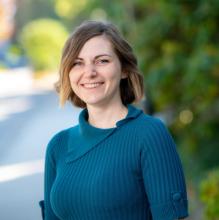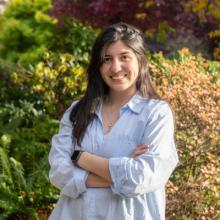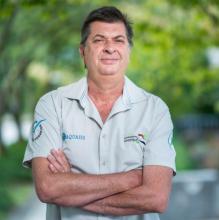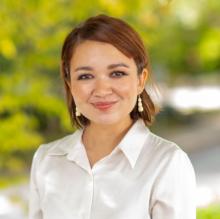Connecting scholarship with creative facilitation work, Ana Elia's research explores the role of gender, social capital and social networks in empowering rural communities through ecotourism projects in Ghana. Working closely with two communities, she co-creates spaces to share research results, in an accessible manner, with the very people facing the socio-ecological challenges in question.
Research Description
In my research, I critically examine the roles that social capital and gender play in empowering the residents of two ecotourism villages in Ghana. This research falls under the rubric of interdisciplinary research on socio-ecological systems, and feeds into literature on community-based natural resources management and participation, community development, forest conservation, gender, social capital and social networks. I also work in collaboration with the Ghanaian Nature Conservation Research Centre (NCRC) as well as two communities engaged in ecotourism in Ghana. During my field work in 2012 and 2013, I lived for five months in the communities, where I built relationships and gathered information, with the support of a fantastic team of local field assistants. Information was collected though surveys and interviews about gender dynamics, trust, reciprocity, common rules, norms, sanctions, and network connections.
What does being a Public Scholar mean to you?
I have the sense that it means engagement, responsibility, creativity, connections, knowledge mobilization, collaboration, and much more! Personally, I believe this Initiative is the perfect way to integrate my two professional passions: community-based development research and creative facilitation.
In what ways do you think the PhD experience can be re-imagined with the Public Scholars Initiative?
With the support of the PSI, a PhD student has now more opportunities to co-learn with their peers, co-design research with the public, discuss with citizens relevant and local research questions, develop media tools to maintain transparency and fluid communication, triangulation, and validation, incorporate multiple voices when interpreting data, or share, with communities of study, research applications in an empowering way.
How do you envision connecting your PhD work with broader career possibilities?
During data collection in Ghana, I came to fully understand the tremendous importance of relationship-building through the arts (singing, dancing, cooking, etc.). Inspired by that experience soon after I came back to Vancouver I began my professional training as a creative facilitator, and I am now on the organizing committee of the 1st Latin American Academy of Socio-Environmental Leadership (ALLSA in Spanish) which is developing a curriculum to integrate creative pedagogies and facilitation skills for young environmental academics and leaders. Throughout these experiences I have expanded my networks, solidified my vision and gained expertise as well as reassurance on the transformative potential of facilitation techniques to integrate science with public participation on behalf of the planet’s well-being.
How does your research engage with the larger community and social partners?
Instead of the common practice of sending a report back to the study communities that only the literate elite have access to, I now have the opportunity to run participatory workshops in Ghana to share, reflect and discuss, in each community, actions based on research results and their concerns. I am very honored and grateful to be able to go back to Ghana and share with them the results of my analyses and discuss ways forward that will help them in their community ecotourism project goals.
Why did you decide to pursue a graduate degree?
My formal undergraduate supervisor back in Spain strongly encouraged me to travel the world and do graduate work. I personally was, and still am, very eager to co-learn with my peers through sharing stories, critically questioning ideas and exploring topics of interest related to current social-environmental challenges related to forests, so I guess, he also saw that in me.
Why did you choose to come to British Columbia and study at UBC?
UBC is a well-known university internationally and when discussing with my friends and peers from 'la Caixa' Scholarship about graduate studies in Canada, they often mentioned UBC as one of the best universities in Canada. Additionally, I found professors in my field pursuing interesting research at UBC that were eager to work with me and mentor me.
The goal of the community workshops in my knowledge mobilization plan is to co-learn and co-create future strategies for ecotourism development based on research results that further the well-being of communities and their ecosystems.




